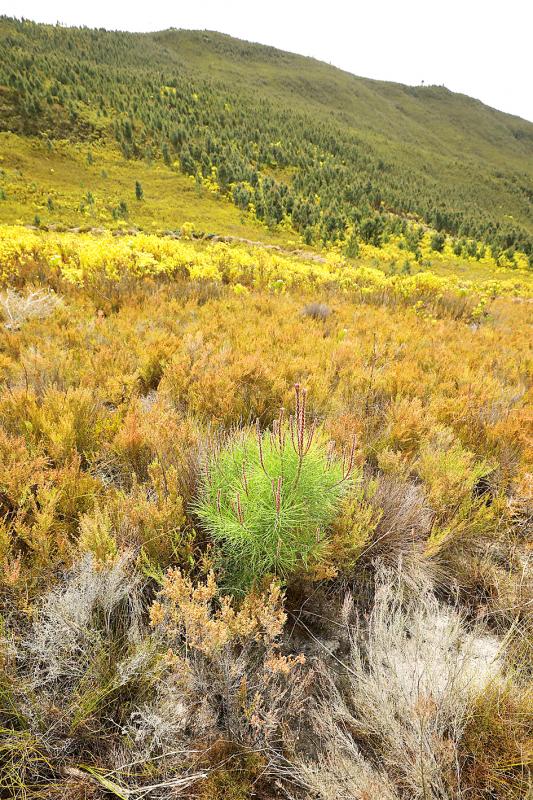In South Africa’s Franschhoek mountains a helicopter drops off abseilers to cut down invasive pine trees that are choking off water supplies to millions of Cape Town residents already facing climate change-induced shortages.
The crews are there to help to remove 54,000 hectares of alien trees by 2025, in the process reclaiming an estimated 55 billion liters of water lost each year — two months of water supply for Cape Town.
Using hand saws to cut saplings while dangling over craggy cliffs, the team is targeting infestations of alien tree species, mainly pine, but also Australian acacia and eucalyptus, that carpet swathes of mountainside in dark green foliage.

Photo: Reuters
“We can’t eradicate the pines, but we’ve got to manage and control them because the scale is too big. It’s a massive problem,” said Louise Stafford, South Africa’s program director at The Nature Conservancy, a non-governmental organization leading the process.
The control of the pines was fast-tracked in 2018, when Cape Town narrowly avoided having its taps run dry during a drought dubbed “Day Zero.”
Pine trees, first introduced from Europe during the 17th century, are now the backbone of South Africa’s commercial forestry industry. However, their small seeds are easily dispersed by the wind and, with no natural enemies, they can spread rapidly from plantations to protected nature reserves, scientists said.
The alien trees also threaten native animals and plants in the Cape Floral Kingdom, where 70 percent of the plants, like the famous fynbos range of plants that are found nowhere else on the planet.
A single pine tree consumes at least 20 percent more water than the fynbos.
The animals under threat include the rough moss frog, which was discovered in 2008, about 100km east of Cape Town on the slopes of Caledon’s Klein Swartberg mountains, which are drained by three vital rivers.
“Out of the five sites we are monitoring, three no longer have any [rough moss] frogs. If we do not remove this carpet of pine trees there is no doubt the frogs will become extinct,” said John Measey, a zoologist at Stellenbosch University’s Centre for Invasion Biology.
Removing dense pine thickets is a huge task, but necessary.
“We are eating this elephant piece by piece,” Klein Swartberg Nature Conservancy chairman Lambert Fick said, as workers prepared ahead of a controlled fire to clear the area — a practice that some conservationists regard as risky.
Introducing moths, weevils or mites is also being considered to combat the trees, said Andrew Turner, a restoration ecologist at government agency CapeNature.
“It is not a silver bullet ... [they] cannot get rid of existing infestations, but rather stop it spreading further,” he said.

Eleven people, including a former minister, were arrested in Serbia on Friday over a train station disaster in which 16 people died. The concrete canopy of the newly renovated station in the northern city of Novi Sad collapsed on Nov. 1, 2024 in a disaster widely blamed on corruption and poor oversight. It sparked a wave of student-led protests and led to the resignation of then-Serbian prime minister Milos Vucevic and the fall of his government. The public prosecutor’s office in Novi Sad opened an investigation into the accident and deaths. In February, the public prosecutor’s office for organized crime opened another probe into

RISING RACISM: A Japanese group called on China to assure safety in the country, while the Chinese embassy in Tokyo urged action against a ‘surge in xenophobia’ A Japanese woman living in China was attacked and injured by a man in a subway station in Suzhou, China, Japanese media said, hours after two Chinese men were seriously injured in violence in Tokyo. The attacks on Thursday raised concern about xenophobic sentiment in China and Japan that have been blamed for assaults in both countries. It was the third attack involving Japanese living in China since last year. In the two previous cases in China, Chinese authorities have insisted they were isolated incidents. Japanese broadcaster NHK did not identify the woman injured in Suzhou by name, but, citing the Japanese

RESTRUCTURE: Myanmar’s military has ended emergency rule and announced plans for elections in December, but critics said the move aims to entrench junta control Myanmar’s military government announced on Thursday that it was ending the state of emergency declared after it seized power in 2021 and would restructure administrative bodies to prepare for the new election at the end of the year. However, the polls planned for an unspecified date in December face serious obstacles, including a civil war raging over most of the country and pledges by opponents of the military rule to derail the election because they believe it can be neither free nor fair. Under the restructuring, Myanmar’s junta chief Min Aung Hlaing is giving up two posts, but would stay at the

YELLOW SHIRTS: Many protesters were associated with pro-royalist groups that had previously supported the ouster of Paetongtarn’s father, Thaksin, in 2006 Protesters rallied on Saturday in the Thai capital to demand the resignation of court-suspended Thai Prime Minister Paetongtarn Shinawatra and in support of the armed forces following a violent border dispute with Cambodia that killed more than three dozen people and displaced more than 260,000. Gathered at Bangkok’s Victory Monument despite soaring temperatures, many sang patriotic songs and listened to speeches denouncing Paetongtarn and her father, former Thai prime minister Thaksin Shinawatra, and voiced their backing of the country’s army, which has always retained substantial power in the Southeast Asian country. Police said there were about 2,000 protesters by mid-afternoon, although